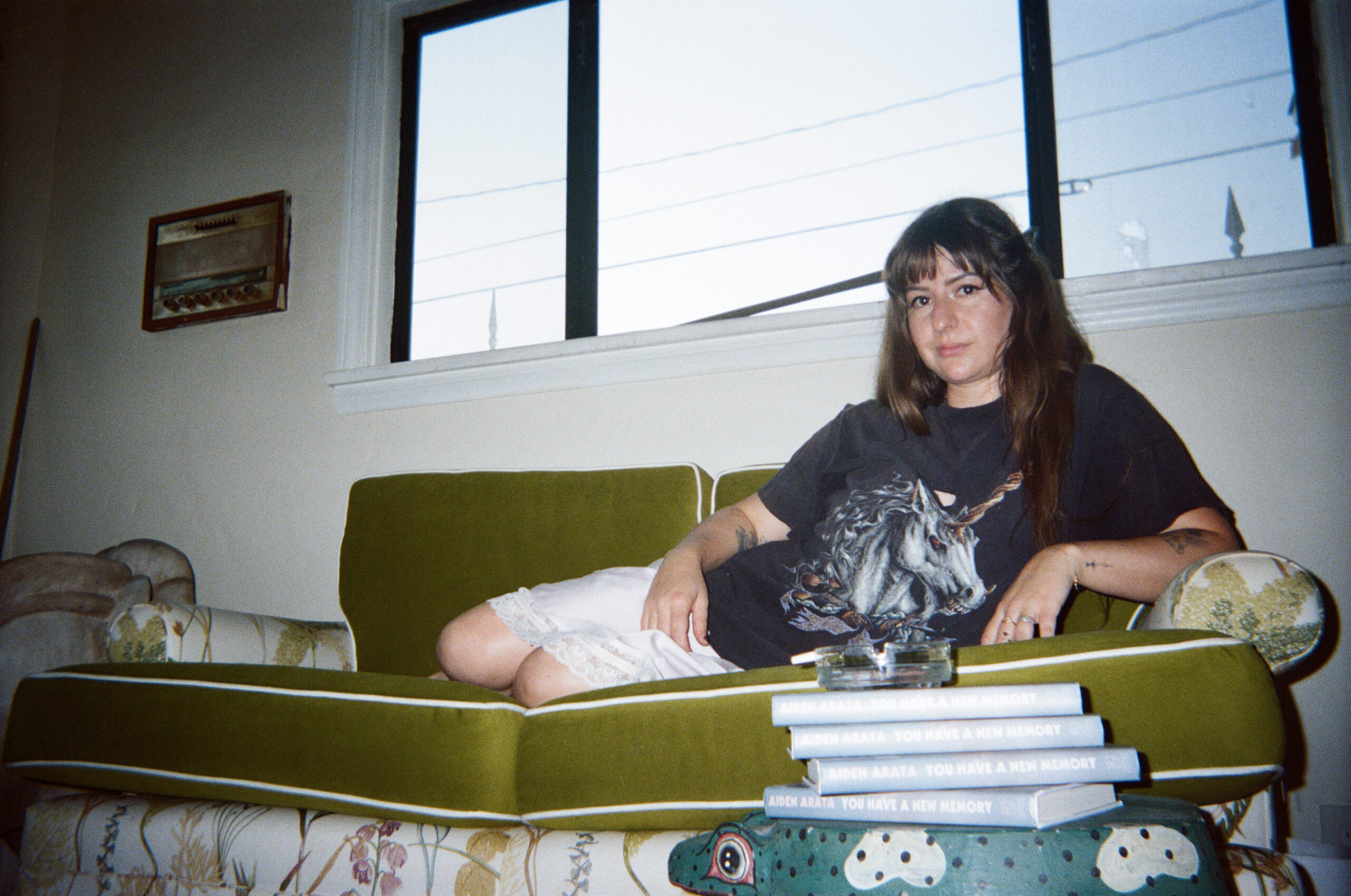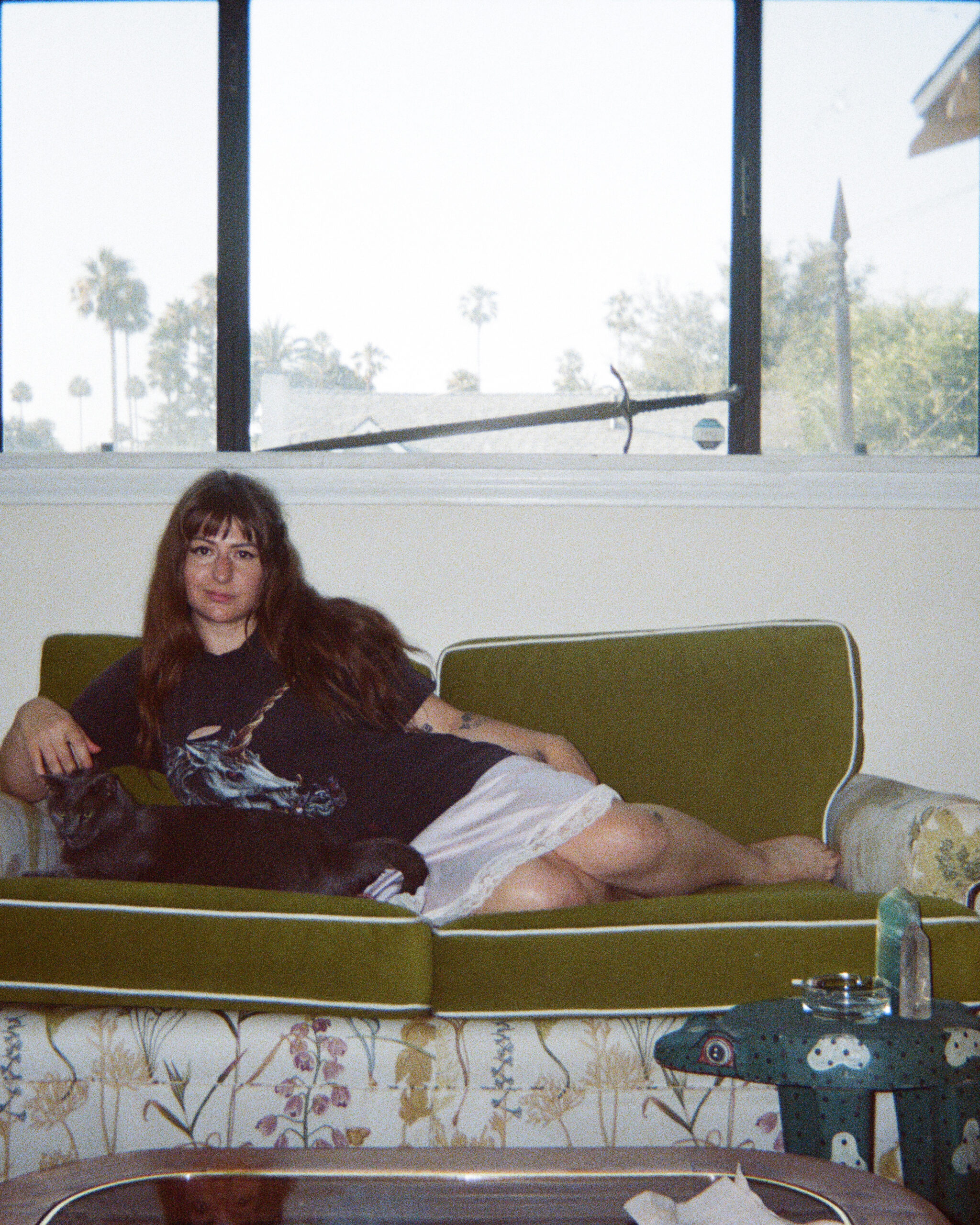
Aiden Arata, photographed by Emma Carpenter.
The line between our real and online selves has quickly dissolved. What do we do now? It’s a question that has long preoccupied Aiden Arata, the writer, artist, and pioneer of moody Instagram memes. So she decided to write about it in You Have a New Memory, her debut essay collection out today. “I wrote a book about the internet to escape the internet,” Arata told Phoebe Bridgers when the two got together earlier this month to grapple with the pure uncanniness of it all. A chronicler of modern malaise in her right, Bridgers, too, has been thinking about the hidden costs of living life online. “David Lynch to real life is your book to the internet,” she told Arata. Below, the pair get deep about crippling anxiety, performative nonchalance, horny minions, and trauma dumping.—CHARLOTTE ZAGER
———
AIDEN ARATA: Hi, Phoebe.
PHOEBE BRIDGERS: Hi, Aiden. I feel like we’re dogs being introduced on leash. I’m about to sniff your ass.
ARATA: Finally.
BRIDGERS: Why did you decide to write a book instead of posting? How does writing a book feel different than writing for the internet?
ARATA: Oh my god. I wrote a book about the internet to escape the internet. I do feel like the good and the bad thing about the internet is its ephemerality—and the idea that you can’t be a perfectionist about it. I don’t know if you watch Love Island, but—
BRIDGERS: Mm-hmm.
ARATA: There’s such a sense of surveillance and being a little bit brain-rotted right now that you have to be perfect and ephemeral and immediate at the same time. There’s something about the expectation for the way that people behave.
BRIDGERS: Yeah.
ARATA: I mean, early social media—when people didn’t know what they were doing and they were just posting horny minion content or whatever—there’s something about that that I feel is very good for a creative practice. I think there’s also something really fucking cool about absolutely committing to your ideas. A book is such a physical object, and I wanted to make a concrete object that could actually situate us in history. And also, I’ve always been a writer first, and I feel like I made memes to trick people into reading my writing.
BRIDGERS: It’s funny because I feel like half of my Explore page is just people tearing each other apart for trying too hard.
ARATA: Yeah.
BRIDGERS: And we’ve talked a lot about the performance of nonchalance in a photo dump. Gen Z doesn’t edit photos as much as millennials did and it’s corny to try—but also, you must perform that you’re not trying. Or, if you’ve seen TikTok ads recently, it’s quite disturbing how they know that they’re supposed to get someone to seem like they’re making an organic video.
ARATA: Yeah.
BRIDGERS: You talk a lot about it in the book—trying to sell a mattress in a nonchalant way, and selling your nonchalant voice for a company that is buying your authenticity.
ARATA: Right. Then it’s super fucking chalant.
BRIDGERS: Does it feel possible to write a book that captures something true about the internet, or does it feel like trying to make a moving weather pattern still for an oil painting?
ARATA: Oh, I love that. I think the book succeeds in talking about the weather pattern because it is impressionist. How do you write without coming off as a reporter being like, “This trend…” And of course, the trend happened three years ago. I think being in on the bit is really important, and being like, “This whole book is basically about my addiction to the internet and its ephemera.” It’s looping and approaching from all these different angles, but it also has that anesthetizing scroll description. It’s a very ambient book, I think, zooming from hyper-specific, granular detail and then zooming out again and talking about deep space and time and the apocalypse and very early civilization.
BRIDGERS: I think people are recoiling at the idea of writing about what it meant to be online during COVID, because we all fucking hated it and joked about banana bread or whatever. But it was a horrific time where Nazis were taking over the world, and it was an emergency to buy the plastic pillowcase that was in your Instagram ad. It was just everything at once. And I think you do a great job of connecting the person who was sexting on AIM and writing on LiveJournal with the adult who was trapped in her home, buying stuff online and watching the world disintegrate.
ARATA: Right. Like, how did we get here?
BRIDGERS: What have you bought online recently? Or what’s the online thing that you were sold that was great?
ARATA: Oh my god, this is a really good question. I am so wary of online ads that I feel so allergic to being sold anything. I’m like, “You are a deep state psyop. You are here to control my serotonin and I will not let you.” So honestly, I do all of my shopping on eBay.
BRIDGERS: Yeah, that’s the way.
ARATA: Oh—candelabras! That’s my one. I got really into buying candelabras on eBay. We need to have you all over for dinner sometime because I have all these fucking candlesticks. They’re really cool.
BRIDGERS: You’ve seen my candelabras. Some of them are definitely from eBay.
ARATA: Yeah, eBay’s the secret. But I’m thinking about what we’re taught—the throughline of not being allowed to just make things, and having to constantly sell things and be sold to and just living in the mall. But I’m pretty sure in the nineties they were like, “This is the corporate apocalypse,” with all the big stores.
BRIDGERS: Yeah, of course.
ARATA: And now I’m like, “Damn, I wish I could go there.” I’ve been thinking a lot about how the greatest minds of my generation are now starting Substacks, about how other people can market themselves better.

BRIDGERS: Well, I wanted to ask about that too, about the format itself, the format of memes. Like, you talk about it in your book—writing a massive paragraph as a joke. That was the new format—like, a big trauma dump over something from The Simpsons or whatever. And that was the internet we met on. And then that, so many times over, has been co-opted by fucking Preparation H or whatever. We’re just living in the world we created. I feel like you and I have both seen people go absolutely wild after a modicum of attention, because attention is really hard to handle. I’m wondering how it feels to put this much of yourself out there.
ARATA: The nice thing is that, being a writer, I’m never going to be an actual famous person. But also, the other side of that is that now there is so much stake in “personal brand” or cult of identity or whatever. You are expected to be this outsized marketing machine for yourself, to be an appealing character. But I think if anyone went into reading it with that expectation, they would be disappointed, because it’s a really weird book. I am choosing to be at peace with it, but I wake up every night at 5:00 AM convinced that I have a sinus infection that’s eating its way into my brain. I am constantly like, “Is my cat dying in another part of the house?” My anxiety is not good. But this is a very honest, vulnerable thing, and I can’t pretend that it’s not effortful. I put so much work into it.
BRIDGERS: I know. And of course I love you, so I’m going into your writing with that in my heart. But you do such an excellent job of preparing the reader for the next phase of your life in a really beautiful way. It is the opposite of a generated story that is attuned to the exact person. Of course, you’re so funny throughout the book, but I love seeing the way that you see the world. It’s not pulling punches as far as subject matter, but it’s funny when it needs to be and very serious when it has to be. I’m actually curious what you wrote first and last, because it’s so sequentially perfect.
ARATA: I wrote “America Online,” the Horny Hobbit essay, first. And I think I wrote the intro last, because I needed to have written everything to know what the book was about.
BRIDGERS: Oh, wow.
ARATA: I feel like I still have a hard time describing what this book is about. I love it so dearly, and I’m also like, “Don’t make me describe it. I lived it.”
BRIDGERS: Yes, you did. It’s interesting to think about: the book ends, but your life just keeps going. Sometimes it just feels like a total wallet trick.
ARATA: Yeah, how does that happen? How do you end it and not die, basically?
BRIDGERS: Yeah.
ARATA: I do feel like I have this sense of aphasia since it ended though. Like, the way that I tell stories is boring now because I put all the story in that. But yeah, I read a lot of fiction while writing this book. I bought a couple editions of Best American Essays because I didn’t know how to write an essay and I wanted to know what the vibe was. But mostly I read fiction, so it’s pretty informed by short stories and that kind of craft.
BRIDGERS: Well, we both love that idea about fiction, how it can be truer than nonfiction because you’re very free. But I think you’ve done a really good job of examining that in yourself. I’ve heard a lot of these stories in this book anecdotally or over natural wine, but to then be thrown into them is such a magical thing. I’m glad you overcame some anxiety about having to stand before the world and be like, “This is true.” We’re all so deep into our own private internet addiction that it stops a lot of people from writing in a format like this. A lot of people’s brains are rotted and sometimes I feel like internet writing is talking down to you from space. But this isn’t written in internet language—that would be exhausting—and it’s not talking down to you. That’s why it’s so fun. Your writing is very trippy. It actually feels like the opposite of being online.
ARATA: Oh, that’s so nice. That’s the highest compliment.
BRIDGERS: David Lynch to real life is your book to the internet. Have you taken sequestration into your real life? I personally feel like I have no control over my phone, so I have to lock myself in a room without my phone and also without any of my friends. And I wish that I had the self-control to just take five hours in the day to be quiet and try to read and not spiral, but it’s very hard.
ARATA: Well, we’ve talked about trying to get into transcendental meditation. I’m still trying to do that, and then I keep falling off.
BRIDGERS: Same.
ARATA: I’m trying to enjoy reading and getting lost in that again. I have a pile of 40 books next to the bed right now, but I would rather watch Love Island and then scroll Reddit to read about Love Island. I think I could have learned German on Duolingo by now with the number of hours that I have put into that. I’m a big fan of “phone in another room.” Going on a walk. Leaving your house. [Laughs] I’ve heard good things.
BRIDGERS: The best. It’s funny that you talked about the mall, because that is my walking meditation: being in the physical center of the market. Walking in a very public place is one of my favorite things to do. It’s so hard to just sit with your eyes closed and focus.
ARATA: Well, that’s so interesting because the internet is this weird thing where you’re so connected and overstimulated, but you’re also really alone. You’re isolated when you’re doing that—you’re on your phone, you’re on your laptop, you’re emotionally tapped in. Isn’t it weird that the internet used to be anonymous? It’s so not anymore.
BRIDGERS: It’s so wild.
ARATA: I feel like I’m grieving my online self. I don’t want to just “generate.” It was very nice of the publisher to set it up, but they arranged this sinister Meta authors webinar. And the whole time, they were like, “Production over perfection, production over perfection.” Which just means: put so much shit out all the time. I think someone in the chat was like, “What if I’m tired?” Or, “Oh, I worked really hard on the book.” And they were like, “Yeah, but you’ve got to just push through. Don’t worry if it’s good, just keep making shit.” And I was like, “Oh my god, this is so upsetting to me.”
BRIDGERS: Also, what are we calling perfection?
ARATA: I don’t even know. I feel like society has surpassed the need for content, maybe. In a lot of ways, consuming content about something—or about an idea—is a very shorthand way of acquiring it, consuming that concept without the work itself. But I think traveling the expanse is the human condition, trying to make meaning from things. Cycles of frustration is the human experience. I don’t know where I’m going with that. We’re just supposed to be hungry and horny—that’s the point. Life is just horniness and humility, and I’m just trying to find the humility that feels divine.
BRIDGERS: I’m trying to find the humility that feels horny.

